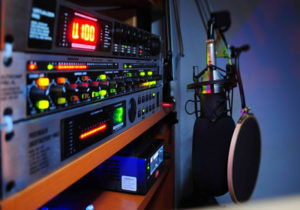NCA and NMC sign Memorandum of Cooperation to regulate broadcast content
 The National Communications Authority (NCA) and the National Media Commission (NMC), Tuesday, signed a Memorandum of Cooperation (MoC) to collaborate to regulate contents of broadcast media organisations to sanitise the broadcast landscape in the country.
The National Communications Authority (NCA) and the National Media Commission (NMC), Tuesday, signed a Memorandum of Cooperation (MoC) to collaborate to regulate contents of broadcast media organisations to sanitise the broadcast landscape in the country.
The memorandum is a mechanism by which the two State agencies will work together to address the challenges of unwholesome broadcast contents on radio and television in the country to improve the broadcast space.
Mr Joe Anokye, Director General of NCA, signed on behalf of the Authority, while Mr George Sarpong, Executive Secretary of NMC, signed on the Commission’s behalf, in the presence of Mr Kojo Oppong-Nkrumah, Minister of Information and Mr Yaw Boadu Ayeboafoh, Chairman of the NMC.
Other signatories were; Mr Ronald Affail Monney, President of the Ghana Journalists Association, Mrs Gloria Hiadzi, Executive Secretary, Ghana Independent Broadcasters Association (GIBA), Colonel Aggrey-Quarshie, Director, Public Relations, Ghana Armed Forces and Mr Sulemana Braimah, Executive Director, Media Foundation for West Africa (MFWA).
Speaking at the event, Mr Anokye, said as an Agency charged with the responsibility of regulating and monitoring licensed and authorization holders, it had no power to regulate contents of media organisations, a situation he said had limited the Authority from undertaking stringent measures including; revoking licenses of broadcasters who churned out unwholesome contents.
He said the MoC would, therefore, enable the Authority to legally apply sanctions when necessary through recommendations from the Media Commission.
“The NCA has punitive powers under the law, but does not have the mandate to regulate content. Per Section 13 of Act 775, the NCA can suspend or revoke the frequency authorization, where it is in the public interest or because of the National Security.
“So upon recommendation of the NMC, the NCA is able to legally apply sanctions. The key here is that if we work collaboratively together then the NMC knowing that the media content is not what it is supposed to be can work with the NCA based on the law that empowers the NCA to be able to apply the necessary sanctions,” Mr Anokye said.
Section 3 (d) of the National Communications Act, 2008, Act 769 requires the NCA to regulate and monitor licensed and authorization holders to ensure that such licenses were used for the purposes which they were issued and acquired.
Mr Anokye said the establishment of the Broadcast Monitoring System, gave the Authority the ability in real time to understand the KPRIs for the licenses that it had, as well as authorizations that had been given out, both for TV and radio and cautioned the public against operating any broadcast oragnisation without authorization from the NCA.
Mr Ayeboafoh, said more often than not, the Commission had been vilified for being inactive even though it had no power to enforce anything beyond asking offenders to render apology or retract stories that were deemed inappropriate.
“But it was found out that for instance, within the Electronic Communications Act, there are provisions there that if properly applied can be useful for all of us and therefore, there was the need to work together, even as we work towards legislation that will eventually transfer power to the NMC,” he said.
He urged journalists to ensure that the average Ghanaian was protected from misinformation, to build public confidence and trust in the media.
Mr Kojo Oppong-Nkrumah, urged the NCA and the NMC to implement agreements of the cooperation to address infractions and sanitise the broadcast airspace.
He advised the NCA to make public its decisions on the revocation of licences of any broadcast media organisation through publications for the avoidance of misconception and mistrust.
Mr Sulemana Braimah of MFWA said the cooperation would also strengthen stakeholders’ efforts towards enhancing press freedom in the country.
Source: GNA
